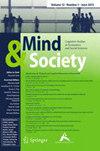性别、家庭类型、种姓类别和社会经济地位对农村人口心理健康的影响
Q1 Arts and Humanities
引用次数: 0
摘要
心理健康(PWB)是一个多维度的概念,可以受到生活的各个方面的影响。本研究旨在探讨性别、家庭类型、种姓类别和社会经济地位(SES)对农村人口心理健康的影响。在这项研究中,随机选择了1216名参与者。采用Sisodia和Choudhary(2012)构建的心理健康量表收集数据。计算临界比和单因素方差分析。结果表明,性别和种姓对农村人口的心理幸福感有显著影响,家庭类型和社会经济地位对农村人口的心理幸福感无显著影响。由此可见,女性受试者的PWB显著高于男性受试者。排班种姓科目的PWB明显高于一般类别科目。中等经济地位被试的PWB也显著高于高经济地位被试。讨论这些发现是为了了解男性、一般种姓类别受试者和较高社会地位受试者低PWB的原因,以便采取措施提高这些群体的PWB。本文章由计算机程序翻译,如有差异,请以英文原文为准。
Effect of Gender, Family Type, Caste - Category and Socio-Economic Status on Psychological Well-Being of Rural Population
Psychological Well-Being (PWB), a multidimensional concept can be affected by various aspects of life. In this study researchers had tried to find out the effect of gender, family type, caste -category and socio-economic status (SES) on psychological well-being of rural population. For this study, 1216 participants were randomly selected. Psychological Well-Being scale constructed by Sisodia and Choudhary (2012) was used to collect data. Critical Ratio and one way ANOVA was computed. Results showed that Gender and Caste significantly affect the psychological well-being while Family type and Socio-Economic Status (SES) did not significantly affect the PWB among the rural population. It can be concluded that female subjects have significantly higher PWB to that of male subjects. Scheduled caste category subjects have significantly higher PWB than that of general category subjects. Middle SES subjects also have significantly higher PWB than the high SES subjects. These findings are discussed to understand the causes of low PWB among male, general caste-category subjects and upper SES subjects so that steps can be taken to enhance the PWB among these groups.
求助全文
通过发布文献求助,成功后即可免费获取论文全文。
去求助
来源期刊

Mind and Society
Arts and Humanities-Philosophy
CiteScore
2.30
自引率
0.00%
发文量
5
期刊介绍:
Mind & Society is a journal for ideas, explorations, investigations and discussions on the interaction between the human mind and the societal environments. Scholars from all fields of inquiry who entertain and examine various aspects of these interactions are warmly invited to submit their work. The journal welcomes case studies, theoretical analysis and modeling, data analysis and reports (quantitative and qualitative) that can offer insight into existing frameworks or offer views and reason for the promise of new directions for the study of interaction between the mind and the society. The potential contributors are particularly encouraged to carefully consider the impact of their work on societal functions in private and public sectors, and to dedicate part of their discussion to an explicit clarification of such, existing or potential, implications.Officially cited as: Mind Soc
 求助内容:
求助内容: 应助结果提醒方式:
应助结果提醒方式:


